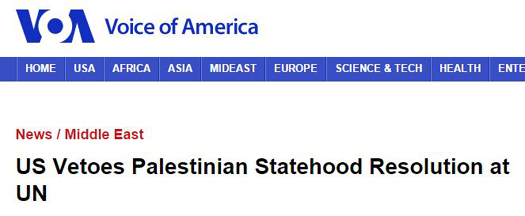BBG Watch Commentary
While the Central News service of U.S. taxpayer-funded Voice of America (VOA) issued a misleading news report and headline that the U.S. used its veto at the UN Security Council against the Palestinian statehood resolution, at least one VOA unit, VOA Learning English Service, got the story right by rejecting the Central News report and writing its own correct news story.
Several VOA staffers called our attention to the accurate, balanced and well-written news report on this story from VOA Learning English Service. However, many other VOA language services picked up and used the erroneous and poorly written VOA Central News reports on the U.S. vote at the Security Council and failed to correct them.
VOA Central News and Russia’s top propaganda outlet RT (formerly Russia Today) were the only major international broadcasters describing the U.S. “no” vote at the UN as a veto, which it was not. READ: Voice of America and RT wrongly call US UN ‘no’ vote on Palestinian state a veto, BBG Watch, January 2, 2015.

Sources told BBG Watch that among the lack of leadership from senior executives, increasing management meltdown and anything goes approach to news reporting, some individual VOA reporters and some services still try hard to maintain high journalistic standards. It often means discarding VOA Central News content and originating their own reports, as VOA Learning English Service did in this case.
According to one VOA journalist who wants to remain anonymous, many reporters working for VOA Central News are equally unhappy with VOA Newsroom management, senior VOA executives and the VOA web operation. Their news reports often wait hours to be posted online, frequently with incorrect deletions and changes. There are also complaints of the lack of coordination and supervision between VOA Central News and the VOA web team. Senior VOA executives have little idea what is going on and fail to read the VOA English website and/or can’t grasp the often glaring omissions and mistakes.
“The Voice of America Newsroom has become a poisonous pit, with some reporters barely able to contain their rage at some editors they see as obstructionist, incompetent and unwilling to give them even minimal support,” a VOA journalist wrote. “It is a tense and unhappy place, with many reporters and editors barely on speaking terms,” the journalist added. VOA is literally falling apart.
We were told that after suffering from poor management for some time in the past, VOA Learning English Service is making a comeback thanks to its talented and dedicated broadcasters who never gave up even when they were working earlier under poor managers. While their reports are written in simplified English, they are often more accurate, more balanced, and more sophisticated than what appears on the VOA main news website.
The VOA Learning English Facebook page has more “Likes” (1,219,036 as of Jan. 3, 2015) than the main VOA English News website Facebook page (801,929 as of Jan. 3, 2015).


VOA LEARNING ENGLISH
Palestinians Fail to Win UN Support on Peace Talks with Israel
12/31/2014
Palestinians Fail to Win UN Support on Peace Talks with Israel
Palestinian leaders have failed in their effort to gain support in the United Nations Security Council for a resolution calling for a peace deal with Israel within a year. They also wanted an end within three years of the Israeli occupation of Palestinian territories.
Israel’s closest ally, the United States, had said it opposed the resolution and would veto it if necessary. But the 15-member council did not pass the resolution. Eight countries supported it: Russia, China, France, Argentina, Chad, Chile, Jordan and Luxembourg. The United States and Australia voted against it. Five countries did not vote: Britain, South Korea, Lithuania, Nigeria and Rwanda. Nine votes were needed for passage.
The Guardian newspaper reports that Nigeria was expected to support the resolution. This would have forced the United States to use its veto power. But Nigerian officials decided not to vote. The Guardian reports American officials persuaded Nigeria not to vote. It says Israeli Prime Minister Benjamin Netanyahu and U.S. Secretary of State John Kerry spoke with Nigerian president Goodluck Jonathan on the telephone, asking him not to support the resolution.
Riyad Mansour is the Palestinian representative to the United Nations. He criticized the vote and said the council is not meeting its responsibilities.
In his words, the council “has once again failed to uphold its charter duties to address these crises and to meaningfully contribute to a peaceful and lasting solution in accordance with its own resolutions.”
Saeb Erekat is a Palestinian negotiator. Before the vote, he said the Israeli government has been, in his word, “stalling” in peace talks for more than 20 years. He said this has kept negotiators from making progress.
Jeff Rathke is a spokesman for the U.S. State Department. Before the vote took place on Tuesday, he criticized the resolution.
“We don’t think this resolution is constructive. We think it sets arbitrary deadlines for reaching a peace agreement and for Israel’s withdrawal from the West Bank.”
American officials have been trying to help Israel and the Palestinians reach a peace agreement. But negotiators stopped meeting in April. However Secretary Kerry has met with officials on both sides since then to try to persuade them to restart talks.
Neri Zilber is an expert at the research group, Washington Institute for Near East Policy. He said before the vote that not much will change even if the U.N. Security Council approved the resolution.
“They’ll (Palestinians) still have to go back and meet with the Israelis face-to- face.”
Mr. Zilber said the Palestinians may have wanted to use the resolution to force Israel to act.
“My sense, just from my meetings with the Palestinian officials, is that they view this more as a pressure tactic on Israel than as a real mechanism to bring about a Palestinian state in the foreseeable future.”
After the vote in the Security Council, Palestinian leaders said they will try to join the International Criminal Court and try to bring charges of possible war crimes against Israel.
I’m Christopher Cruise.
VOA State Department Correspondent Pam Dockins reported this story from Washington. Christopher Cruise wrote it for VOA Learning English. Caty Weaver edited the story.
_____________________________________________________________
Words in This Story
stalling – v. to avoid doing something or to delay someone in a deliberate way because you need more time or do not want to do something
constructive – adj. helping to develop or improve something; helpful to someone instead of upsetting and negative
arbitrary – adj. not planned or chosen for a particular reason; not based on reason or evidence; done without concern for what is fair or right
tactic – n. an action or method that is planned and used to meet a particular goal
mechanism – n. a process or system that is used to produce a particular result
Do you oppose or support the Palestinian resolution? Why or why not? Are you affected by the lack of a peace agreement between Israel and the Palestinians? We want to hear from you. Write your thoughts in the comments section.
END OF VOA LEARNING ENGLISH REPORT